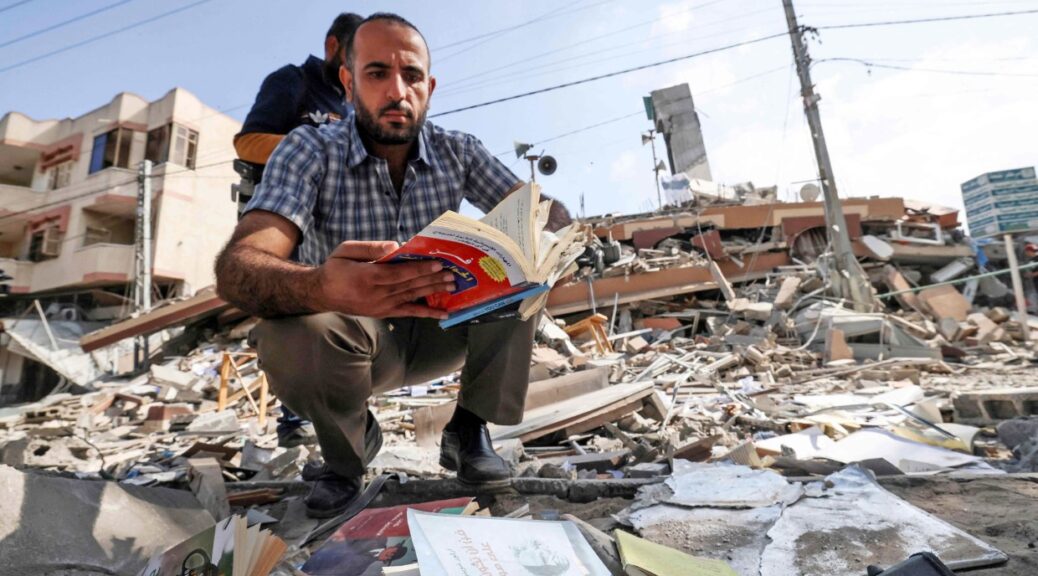Beloved Gaza bookshop becomes a casualty of Israel-Hamas conflict
“If I compare it to what is happening, it is minimal, but destroying the main bookstore we have is something serious,” said Refhat Alarir, an academic.
At 6 am on Tuesday, Sameer Mansoor answered the call at his Gaza City home. This Israeli army was asking if it was a little more than a mile away inside its bookstore and publishing house. They said that they did not want to hurt her and then they disconnected the phone.
Shortly afterwards, the store – a beloved local institution standing on the ground floor of a large building – collapsed into a pile of rubble.

Established 21 years ago, his bookstore was one of the biggest sellers of books for children, students, academics and reading enthusiasts in the Gaza Strip. He also published books and published stories written by local authors.
“The bookstore was like my soul,” said 53-year-old Mansoor, who was born in the Gaza Strip and said he had nothing to do with politics.
“Books are my life.”
The Mansoor shop was one of the casualties of the fighting between Israel and Hamas, the militant group that controls the barricaded and impoverished Gaza Strip, home to 2 million Palestinians. Hamas has been labelled a terrorist organization by Israel and the United States.
According to officials on both sides, at least 230 Palestinians and 12 Israelis have been killed in the fighting. According to the Government Information Office in Gaza, 184 residential buildings and 1,335 housing units have been destroyed in Gaza.
A spokesman for the Israeli Defense Forces said they could not find specific information about the attack on the building that houses the bookstore.
The Israeli military said it has targeted more than 1,000 targets since the fighting began earlier this month. Israel says that its purpose is to avoid civilian casualties and that Hamas intentionally takes responsibility for locating its military infrastructure with civilians.
In addition to Israeli airstrikes, nearly 600 of the more than 4,000 rockets fired from Gaza towards Israel have fallen and landed in the Gaza Strip, according to the Israeli military, since the beginning of the fighting.
For the Palestinians, the bookstore played an important role as a centre of intellectual life, and its destruction represents a widespread loss of culture in Gaza.
“If I compare it to what is happening, it is minimal, but it is something serious to destroy the main bookstore we have,” Refhat, an academic and editor of the short story collection “Gaza Rights Back,” Alarir said.
Alarir has shopped in stores since 1997 when he began his studies at the Islamic University of Gaza. In addition to selling several titles in English, he said, the shop often supplies titles requested by customers and makes them affordable, something that other local bookstores were not able to do.
He now worries that “people won’t be able to buy the books they want, people won’t be able to read some novels for their university studies, especially for English majors.”
For Eman Bashar, Mansoor’s bookstore was more than just a place to buy books, it was a place where she met the man who had become her husband, a Palestinian writer of “The Complete Works of Ghassan Kanafani” Was bonding over a copy.
In the years that followed, Bashar, an English teacher, has built a library in his Jabalia home, which consists mainly of shop-bought books.
“This is where we met, so it killed a memory for me. It was very precious to us,” Bashar, who has two sons, said in a phone interview.
Located near several universities, including the Islamic University, Mansoor’s bookstore was also the informal home of several English-language book clubs.
Rahf Al Hallaq, a student of English literature at Islamic University, said, “When you lose a place like this, it breaks your heart because it takes away that place, which makes you the person you are.”.This latest round of fighting between Israel and the Palestinians began on May 7, when Israeli police raided the Al-Aqsa Mosque complex in Jerusalem during the Muslim holy month of Ramadan. Hamas responded by firing a rocket at Israel, which has responded with its bombing campaign.
Mansoor said he would like to renovate his store one day, though he is unsure when it will be.
“We’ll wait until the war is over,” he said.
